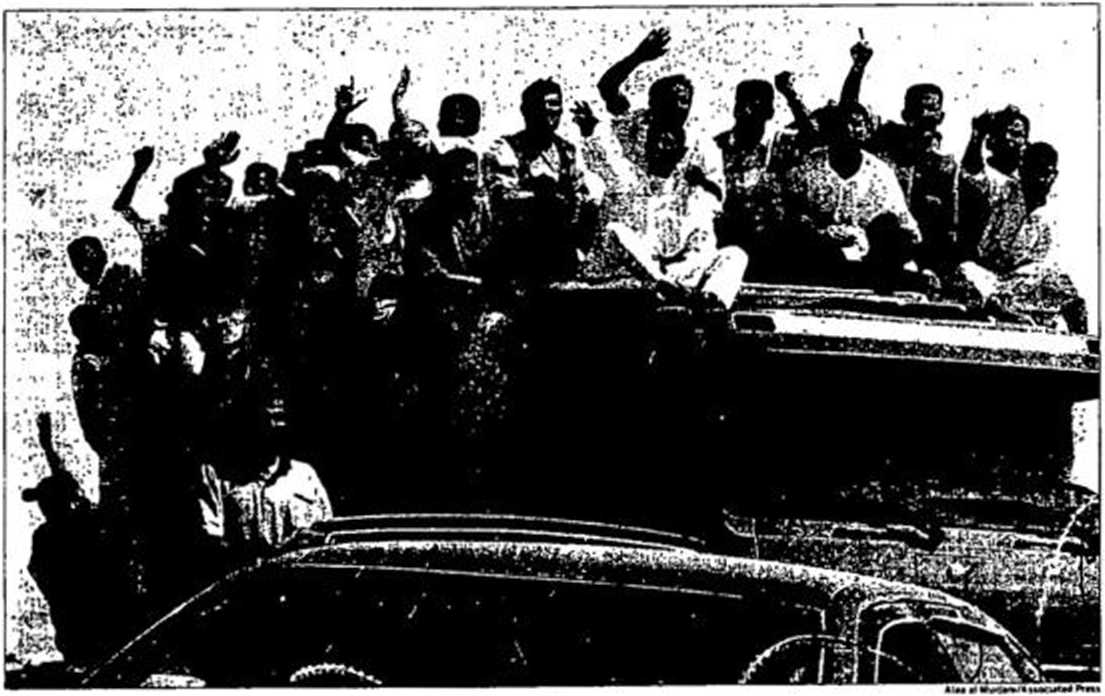266370966
Revue de Presse-Press Reviezo-Berhevoka ęape-Rivista Stampa-Dentro de la Prensa-Basin Ozeti
Clerics forge plan for peace in Najaf
Dozens killed before accord is reached
International Herald Tribune
Friday, August 27,2004

By Dexter Filkins
NAJAF, lraq: Iraq’s most powerful Shiite cleric, Grand Ayatollah Ali al-Sistani, and the rebel cleric Moktada al-Sadr met Thursday and forged an agreement aimed at ending the fighting that has engulfed this city for the past three weeks, aides to the clerics said.
The aides, while describing the talks as successful, did not provide details of the agreement. But they indicated that the thousands of followers who jour-neyed here Thursday to join Sistani would be allowed to demonstrate on Friday as a prelude to some form of fi-, nal resolution.
The agreement still reąuires approv-al from the Iraąi govemment, the aides said, and they were waiting for that. But at least twice, agreements with Sadr have fallen apart, leading to a re-sumption of fighting.
The aides, who called a news confer-ence at 11 p.m. here to discuss the talks, hinted at good news to come later in the night and indicated that Sadr might go on television to speak.
Sistani, the senior Shiite cleric, had called for a mass demonstration to end the fighting when he retumed to the country on Wednesday from a hospital stay in London.
On Thursday, thousands of his sup-porters trailed his convoy and flowed in from other parts of Iraq to mark his entrance into the holy city, where
American forces have battled almost to the gate of the shrine where Shiite in-surgents are based.
But the occasion of his return was marred by widespread violence. At least 45 people were killed and hun-dreds were wounded by gunfire and in a mortar attack.
U.S. forces have been battling Sadr’s militia for three weeks here.
Sistani, who commands the loyalty of millions of Shiite Muslims, had urged his followers Wednesday not to enter the city’s gates until he arrived in Najaf from Basra, in Southern Iraq. His return to the holy city has been seen by Iraqi and American officials as offering a way out of the fighting.
But early Thursday, Najaf and neigh-boring Kufa erupted into mayhem and bloodshed. A mortar barrage slammed into a mosque in Kufa filled with Iraqis preparing to march on Najaf, killing at least 27 people and wounding 63, and at least 3 people were killed when Shiite marchers were fired on there.
It was not immediately elear who was responsible for the attacks.
At least 15 people were killed, ac-cording to Najaf hospital officials, when lraqi forces opened fire over the heads of people, trying to prevent them from making their way to Najafs Old City, where the Imam Ali shrine is lo-cated.
The crowd stampeded, with some people helpingthe wounded away from the violence.
Casualty numbers climbed through the day. Reuters and Agence France-Presse reported that, according to the Health Ministry, 74 people were killed on Thursday.
Altogether, the ministry said in a statement, about 95 people had been killed in Kufa and Najaf within 24 hours, The Associated Press reported.
A supporter of Sistani from Baghdad, Hazim Kareem, said he was among marchers trying to get through an Iraqi police blockade set up to stop vehicles and people.
“You know how religious we are; we kept trying,” said Kareem. “Some armed men appeared and entered our crowd. I don’t know who they were. They fired at the police.
“Then the police went crazy and just started shooting everywhere," he said. “I saw two dead policemen."
After arriving in Najaf, Sistani went to a private house, surrounded by the police, to rest after the long joumey by road from Basra.
Three hospital workers said they had tried to enter the shrine area to pick up casualties but were halted by sniper fire. Bleeding bodies were piled up on stretchers.
“Go look at the morgue,” one worker said. “It’s fulL”
The sound of mortar fire and explo-sions reverberated in the city early Thursday, but then tapered off.
The New York Times
Alex Berenson contributed reporting from Najaf for this article and Christine Hauser contributed reporting from New York.
■ Oil pipelines sabotaged
A sabotage attack on a cluster of about 20 oil pipelines in Southern Iraq has cut ezports from the major oil pro-ducing region by half, an oil official told The Associated Press in Basra.
It was the latest insurgent attack to set back Iraq’s oil sector, a crucial source of funds for the country*s recon-struction.
The pipelines were attacked late Wednesday in Berjasiya, Southwest of Basra, an official with the state-run South Oil said on condition of anonym-ity.
Oil exports out of Southern Iraq aver-age about 1.85 million barrels a day. The oil official said Wednesday’s sabotage cut exports to 900,000 barrels.
Cheering Shiite faithful following the convoy of Grand Ayatollah Ali al-Sistani on Thursday as he madę his way to the holy city of Najaf, Iraq, to broker a peace agreement.
54
Wyszukiwarka
Podobne podstrony:
Revue de Presse-Press Reviezv-Berhevoka ęape-Rivista Stampa-Dentro de la Prensa-Basin Ozeti sister a
Revue de Presse-Press Reviezv-Berhevoka ęape-Rivista Stampa-Dentro de la Prensa-Basin Ozeti a Fallou
Revue de Presse-Press Reviezv-Berhevoka ęape-Rivista Stampa-Dentro de la Prensa-Basin Ozełi Le messa
Revue de Presse-Press Reviezv-Berhevoka ęape-Rivista Stampa-Dentro de la Prensa-Basin Ozeti dom now,
Revue de Presse-Press Reviezv-Berhevoka ęape-Rivista Stampa-Dentro de la Prensa-Basin Ozeti t D I T
Revue de Presse-Press Reviezv-Berhevoka ęape-Rivista Stampa-Dentro de la Prensa-Basin OzetiU.S. forc
Revue de Presse-Press Reviezu-Berhevoka ęape-Rivista Stampa-Dentro de la Prensa-Basin OzetiSistani l
Revue de Presse-Press Reviezv-Berhevoka ęape-Rivista Stampa-Dentro de la Prensa-Basin Ozełi l i Poli
Revue de Presse-Press Reviezo-Berhevoka ęape-Rivista Stampa-Dentro de la Prensa-Basin OzetiKurd rela
Revue de Presse-Press Reviezv-Berhevoka ęape-Rivista Stampa-Dentro de la Prensa-Basin Ozeti religion
więcej podobnych podstron